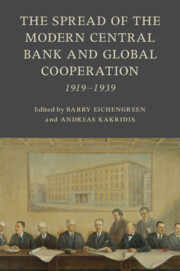Book contents
- The Spread of the Modern Central Bank and Global Cooperation
- Studies in Macroeconomic History
- The Spread of the Modern Central Bank and Global Cooperation
- Copyright page
- Contents
- Figures
- Tables
- Editors and Contributors
- Preface
- Part I General
- Part II Specific
- 5 Central Bank Policy under Foreign Control
- 6 Sneaking Nationalization
- 7 The Bank of Poland and Monetary Policy during the Interwar Period
- 8 From Banking Office to National Bank
- 9 ‘Nobody’s Child’
- 10 The Bulgarian National Bank, 1926–1935
- 11 Macroeconomic Policies and the New Central Bank in Turkey, 1929–1939
- 12 Latin American Experiments in Central Banking at the Onset of the Great Depression
- 13 Central Banks in the British Dominions in the Interwar Period
- 14 Central Banking and Colonial Control
- Index
- References
11 - Macroeconomic Policies and the New Central Bank in Turkey, 1929–1939
from Part II - Specific
Published online by Cambridge University Press: 02 November 2023
- The Spread of the Modern Central Bank and Global Cooperation
- Studies in Macroeconomic History
- The Spread of the Modern Central Bank and Global Cooperation
- Copyright page
- Contents
- Figures
- Tables
- Editors and Contributors
- Preface
- Part I General
- Part II Specific
- 5 Central Bank Policy under Foreign Control
- 6 Sneaking Nationalization
- 7 The Bank of Poland and Monetary Policy during the Interwar Period
- 8 From Banking Office to National Bank
- 9 ‘Nobody’s Child’
- 10 The Bulgarian National Bank, 1926–1935
- 11 Macroeconomic Policies and the New Central Bank in Turkey, 1929–1939
- 12 Latin American Experiments in Central Banking at the Onset of the Great Depression
- 13 Central Banks in the British Dominions in the Interwar Period
- 14 Central Banking and Colonial Control
- Index
- References
Summary
This chapter analyses macroeconomic policy, with a focus on monetary policy, relating it to the performance of the economy in Turkey in the Great Depression. The Depression was transmitted to Turkey primarily through a sharp decline in agricultural commodity prices. In response, the government adopted strongly protectionist measures starting in 1929 and pursued import-substituting industrialization. In contrast, Turkey’s macroeconomic policy was cautious. Fiscal policy adhered to the principle of balanced budgets. The policies of the new central bank, established in 1930, were similarly restrained: as a result, the monetary base increased very little before 1938. While this restraint resulted in some appreciation of the currency, Turkey’s economy did better than most others around the Eastern Mediterranean. The chapter argues this performance was primarily due to strong protectionism, which paid benefits in the short run, and recovery in the agricultural sector.
Keywords
- Type
- Chapter
- Information
- The Spread of the Modern Central Bank and Global Cooperation1919–1939, pp. 301 - 319Publisher: Cambridge University PressPrint publication year: 2023

